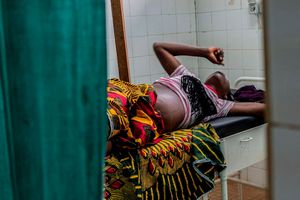Why cases of unsafe abortion are rising

Teenage girls who become pregnant as a result of rape or defilement are more likely to seek unsafe abortions, face lifelong trauma, or become trapped in cycles of poverty and abuse.
What you need to know:
- 355 women die each year for every 100,000 live births due to pregnancy-related complications.
- Additionally, five women were reported to have died from abortion-related complications, while eight others remained in a coma.
Women and girls who become pregnant from rape or defilement are avoiding healthcare facilities, instead risking their lives through unregulated procedures due to fear of prosecution and unclear abortion legislation, according to the Reproductive Health and Rights Alliance.
"The perception that abortion remains universally illegal drives vulnerable survivors underground, where they face life-threatening complications, including haemorrhage, infection, and permanent injury. Constitutional ambiguity has also created a healthcare crisis," explains Annet Nerima, programme manager at the Kenya Human Rights Commission.
Healthcare professionals report a disturbing pattern of preventable fatalities and severe medical complications among sexual violence survivors who attempt backdoor procedures rather than risk prosecution.
“The Constitution says that abortion is illegal. Because of that, many rape and defilement survivors decide to go for unsafe abortion for fear of prosecution or arrest. They opt for a clandestine approach, and that's what has caused deaths, with some survivors going into coma as a result.
“The only chance that somebody is given to do an abortion is when it's prescribed by a medical professional, and on grounds that somebody's life is at risk. For instance, if your life is at risk as a result of a pregnancy that has occurred due to defilement or rape, and the doctor examines you and prescribes that you terminate the pregnancy because it's threatening your life, that is the only way an abortion can be procured,” she explains.
Mental health
She notes that even though a pregnancy resulting from rape or defilement can significantly threaten a woman's mental health, causing severe psychological distress, including depression, anxiety, and post-traumatic stress disorder (PTSD), its termination is still disregarded as unlawful.
“There have been cases put forward in court to argue from that angle, but they have not yet been determined. So at this point, we can just say abortion is illegal unless it's prescribed by a medical professional,” says Nerima.
She adds that besides this legal hurdle, law enforcement, health institutions and policy actors have also failed to respond effectively to rape and defilement. As a result, many young girls get pregnant and face stigma, eventually being forced to abort or abandon their education.
“Instead of receiving justice and care, survivors are often silenced by cultural taboos, weak legal enforcement, and a health system that is ill-prepared to offer timely, comprehensive post-rape services. These failures have dire consequences. Teenage girls who become pregnant as a result of rape or defilement are more likely to seek unsafe abortions, face lifelong trauma, or become trapped in cycles of poverty and abuse,” says Nerima.
Health facilities, she explains, lack capacity to provide basic and comprehensive post-abortion care, with only 18 out of every 100 primary healthcare facilities offering “all elements of basic post-termination care, and 24 out of every 100referral level facilities providing the full package of comprehensive post-abortion care.
“These statistics align with research findings indicating that 355 women die each year for every 100,000 live births due to pregnancy-related complications. Additionally, five women were reported to have died from abortion-related complications, while eight others remained in a coma. The report further disclosed that 16.6 per cent of the cases were deemed potentially life-threatening outcomes that could have been prevented with timely and adequate medical intervention,” saysNerima.
She further notes that the government’s constant reduction of the annual health budget has resulted in lack of adequate sexual and reproductive health services, leading to an increase in unsafe abortions. “By so doing, the country has fallen short of its commitment to the Abuja Declaration to allocate at least 15 per cent of its national budget to the health sector. The declaration was signed by African heads of state, including Kenya, in 2001 to improve the health sector.”
Linda Mama
In the 2022-2023 financial year, the Treasury allocated Sh146.8 billion to the health docket against an annual budget of Sh2.25 trillion, representing 4.89 per cent of the total budget. In the financial year 2023-2024, the health docket received Sh142 billion against an annual budget of Sh4.34 trillion, which is 9.7 per cent. In the financial year 2024-2025, the government allocated Sh127 billion to the health sector against an annual budget of Sh3.992 trillion, representing 11 per cent of the total budget.
The free maternal care programme (Linda Mama) also experienced a reduced budget allocation by nearly half. In the financial year 2023-2024, it received Sh4 billion, but during the current financial year, this amount was cut to Sh2 billion.
“Although we acknowledge that the health budget has increased in some instances, the failure to align it with the Abuja Declaration has inadvertently resulted in a lack of adequate sexual and reproductive health services. Several key studies and reports have documented the link between inadequate government financing for sexual and reproductive health services and the prevalence of unsafe abortions,” says Nerima.
The Alliance is now demanding that the government allocates adequate resources for reproductive health services and maternal healthcare in the next financial year of 2025-2026 as well as effective investigation, prosecution, and survivor support for rape and defilement cases.
The Aliance is also calling for scaling up of youth-friendly and adolescent-specific sexual reproductive health services, including emergency contraception and safe abortion where legally permitted, and psychosocial support is offered. They are also calling for mandatory re-entry policies for pregnant girls and robust school retention strategies, as well as nationwide campaigns to combat stigma, educate communities, and empower survivors.


